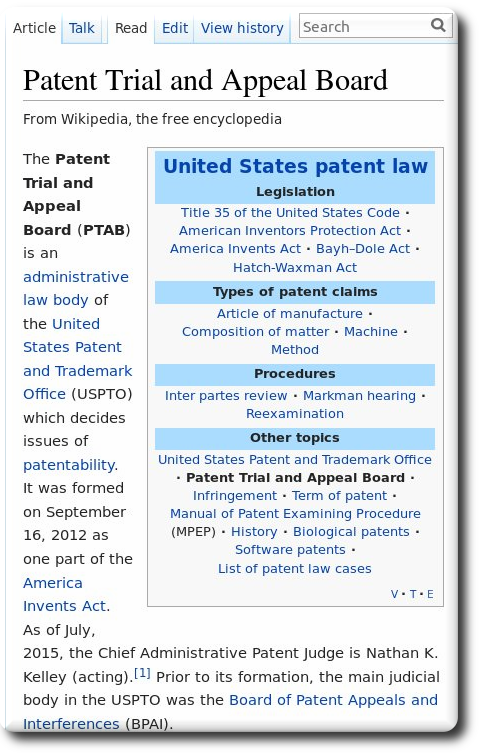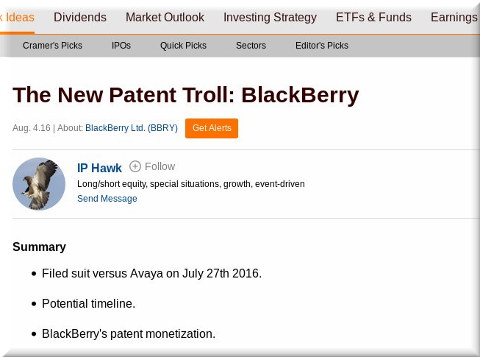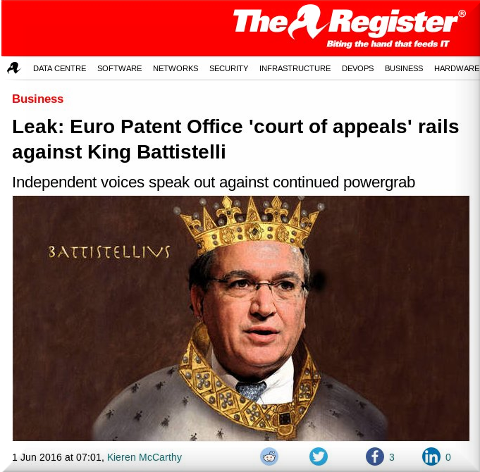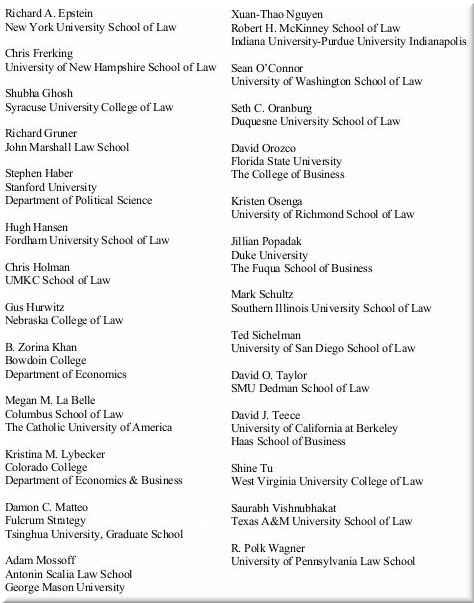08.05.16
Posted in America, Deception, Patents at 3:33 pm by Dr. Roy Schestowitz
Still championing patent quality after a dark age of rubberstamping under David Kappos

Summary: Hope for the US patent system as some of the most controversial abstract patents are declared invalid and thrown aside
THE ROLE of the PTAB, the scientific collective responsible for abolishing a lot of software patents by proactive action, is increasing. Things are changing very rapidly, but corporate media isn’t reporting (or misreporting) on it. This is good news for opponents of software patents anywhere in the world.
PTAB has enemies. Its enemies are people who profit from patents on software, notably patent lawyers. They are currently discrediting PTAB using the term/notion of “reverse patent trolls” (invalidating bad patents is trolling?!). MIP has had a decent series about PTAB this past week. The earlier part speaks of “authors of a new white paper [who] believe that almost 75% of pharmaceutical patent settlements at the Patent Trial and Appeal Board meet the criterion for inferring a strong likelihood of reverse payment settlement. The paper also suggests a rule to deter attempts to exploit the Board as a holdup device as well as discussing reverse patent trolls” (meaningful and inappropriate term).
“Things are changing very rapidly, but corporate media isn’t reporting (or misreporting) on it.”Lobbyist for software patents, David Kappos, also pushed out a so-called ‘white paper’ without disclosing who was paying him for all that (it’s pretty ugly and it definitely discredits the USPTO where he was previously a Director, the highest position and equivalent of President at the EPO).
Another installment from MIP then gave a detailed breakdown of law firms that profit from all this chaos of poor patent examination at the Patent Office. We recognise many of these firms. MIP said that “Sterne Kessler has become the first law firm to handle more than 500 AIA proceedings, with a particularly strong showing representing defendants. Fish & Richardson is the top law firm for challengers at the PTAB, breaking the 300 petition mark” (Fish & Richardson was mentioned here many times before.
The part which we didn’t quite appreciate was the one where Michael Loney of MIP was cherry-picking like climate change denialists, making it appear like PTAB was on the decline with the headline “July CBM petition filing slumps to lowest level since February 2013″ (skip to third paragraph for context).
PTAB staff may be taking their summer’s break and as Loney later noted, “PTAB Monthly Data and Analysis: July was the second-busiest month of 2016 for petition filing, but covered business method petitions fell to the lowest level since February 2013. Recent decisions from the Board include cancelling claims on a patent that had been used to sue more than 250 defendants” (CBMs are part of a broader picture).
“This is good news for opponents of software patents anywhere in the world.”To put things in perspective: “The month seems particularly strong when compared with that time of year in previous years. July in 2015 and 2014 was a relatively quiet month with both June and August of those years having at least 50 more petitions filed than the July figure.” Another article took note of 11% litigation decline last month, showing that the system was gradually correcting itself. To quote, “407 cases were filed in US district courts in July, with two new plaintiffs leading the way and entities such as Shipping and Transit, Uniloc, Sportbrain and Guyzar adding to their 2016 totals” (these are mostly patent trolls).
MIP looked more closely at one particular case and said: “The Patent Trial and Appeal Board (PTAB) has invalidated all the claims of a patent owned by storage software company Boxbee in a post-grant review (PGR) proceeding brought by Netsirv and Local Motion. This is the third final written decision in a PGR, all of which have resulted in patents being invalidated.”
It is hardly surprising. PTAB typically demolishes the patents it looks into, leaving patent lawyers rather scared and bashful (in the face of their clients). A software patents lobbying site, for example, got so upset at PTAB that Gene, its founder, tried cursing at it (“impotence”). Here is a new take about PTAB in the “Post-Alice World”. It says: “Only 16% of the Board’s eligibility decisions fully reversed the eligibility rejections, and none of the other 84% of the applications have been allowed despite the effort and the expense of the appeal.”
“PTAB typically demolishes the patents it looks into, leaving patent lawyers rather scared and bashful (in the face of their clients).”Yes, so what? They’re obviously trying to discredit PTAB, a cornerstone of AIA. Here is one patent attorney leaning on Bascom, in spite of the case's old age (they’ll refer to it forever because they’re running low on supportive cases), saying it “turns this on its head by holding that the Patentee must proffer prior art to show 101 validity. Alice shifts burden of proof.” A sponsored “REPORT” (i.e. paid marketing) from IAM repeats this same talking point. They just can’t help it, can they? PTAB combined with Alice is a nightmare to them and all they can do it ridicule Justices, call PTAB “impotent” (low blow), and mislead clients into believing that nothing has changed.
“Lawyers are liars,” my wife told me years ago. She had heard that saying quite a lot. It certainly is the case when it comes to a lot of patent lawyers, at least those who are pushing their agenda into articles (self promotion disguised as ‘analyses’). █
Permalink
 Send this to a friend
Send this to a friend
Posted in America, Patents at 8:52 am by Dr. Roy Schestowitz
…Not even if the algorithms are run on some “general purpose computer” (whatever that means!)

Summary: Software patents and lawyers who depend on them are running out of time and running low on spin/cherry-picking/excuses
YESTERDAY we wrote about video streaming patents and a notorious podcasting patent getting invalidated, with admission from the USPTO that it granted in error (prior art, not just Alice). Some software patenting proponents caught up with it and posted a link to the full decision: “Dist. Of DE Kills 2 Video Streaming Patents with Alice/ 101: http://assets.law360news.com/0824000/824998/04313306922.pdf …”
The word “kills” is intended to give this a negative connotation, just like “attacks” and “death squad” (same person uses these words a lot).
This wasn’t a CAFC decision and that’s actually noteworthy because nowadays the Court of Appeals for the Federal Circuit (CAFC) is a lot more likely to invalidate/reject software patents based on Alice. Speaking of CAFC, a new article by Dennis Crouch speaks of scope limitation induced by “consisting of” inside patents. To quote:
Although our attention over the past few years has focused more on eligibility and definiteness issues, claim construction continues to befuddle the courts. In MultiLayer Stretch Cling Film v. Berry Plastics (Fed. Cir. 2016), the Federal Circuit has offered a split interpretation of the patent’s Markush group claim element.
The asserted cling-film claim requires “five identifiable inner layers with each layer being selected from the group consisting of LLDPE, VLDPE, ULDPE, and mLLDPE resins.”
So here we have another example of tightening patent scope, other than what’s related to Alice.
Speaking of Alice and CAFC, Troutman Sanders LLP wrote in the software patenting proponents’ site earlier today, noting that according to CAFC, “Software means plus function claims Indefinite for failure to disclose algorithm,” or in other words software patents are not “function [if you] then disclose a “general purpose computer” as the structure performing that function.”
This is noteworthy because efforts to pass/sneak in software patents in India, Europe and New Zealand have relied on attempts to ascribe physical properties to software by stating in the patent application that it runs on some machine (typically just some ordinary off-the-shelf PC or server). To quote the funnier part from the above: “The Court also affirmed that the this means-plus-function term was indefinite. In the case of computer-implemented functions, the specification must disclose an algorithm for performing the claimed function. The patents-in-suit did not disclose an operative algorithm for the claimed “symbol generator.” The function of generating symbols must be performed by some component of the patents, but the patents did not describe this component.”
So the patent/s did not even describe an algorithm, let alone pseudo-code!
It definitely looks as though patent lawyers are growing nervous, seeing year after year how more and more abstract patents get thrown down the toilet/wastebasket, essentially devaluing the remainder (those not tested in the court or in PTAB, which we shall write about next). █
Permalink
 Send this to a friend
Send this to a friend
Posted in America, Patents at 8:27 am by Dr. Roy Schestowitz

Summary: Transition from production to so-called ‘licensing’ (i.e. patent shakedown), as Microsoft has been doing against Android/Linux/ChromeOS, compared publicly to patent trolling
BlackBerry is gradually becoming more of a patent troll. We warned about this several years ago and now it’s officially happening. We wrote about this earlier in the day yesterday and shortly afterwards we found the article “The New Patent Troll: BlackBerry” (via The IP Hawk, who actually wrote it).
What’s nice to see here is that our prediction was correct. It’s sad to see once-practicing companies resorting to these tactics because their sales or market share are minuscule and products not compelling/competitive anymore.
Yesterday we mentioned Forbes suggesting that it’s possible Nintendo can come under many software patent lawsuits. Some in the patent-centric press are now wondering aloud if Nintendo will use patents for revenue, as means of deriving money from Pokemon GO:
With all due respect, this blogger remains skeptical about these several expressions of seemingly limitless optimism for Nintendo’s IP potential on mobile. He can never forget the valuation of nearly $2.5 billion dollars or more that was coming from the investment community in 2011 regarding the Kodak patent portfolio, here. When the dust settled in the court-managed proceedings, the patent portfolio was sold for only approximately $500 million dollars, here. This blogger has not deviated from the sense that the initial estimate was as much (or more) about hope, prayer, and investment house spin as an indication of genuine market value.
For that reason, when Mr. Fischer suggests that the company can unlock IP licensing revenues—of company patents– ranging from $290 million to $570 million, this blogger needs to ask: What is there in the company’s patent portfolio (separate apart from licensing of the character rights), that supports such an amount? Indeed, how is the value of this estimate range reached?
Well, software patents haven’t a foothold anymore, so suggesting that companies will shell out hundreds of millions of dollars for these is totally disconnected from reality. As for BlackBerry, it is suing in Texas now, perhaps hoping that this defunct and bias ‘legal’ system would favour its patents (which to be fair include quite a few hardware patents, not just software patents). █
Permalink
 Send this to a friend
Send this to a friend
08.04.16
Posted in America, Patents at 3:35 pm by Dr. Roy Schestowitz
BlackBerry is not a friend but growingly a troll as business prospects sour

Summary: Apple’s “thermonuclear” war on Android is helping parasites, venue-shifting to Texas remains a problem, and BlackBerry fulfills our expectation of becoming a patent assertion entity (practically a troll) down south in Texas
OVER THE years GNU/Linux became just “Linux” (a misnomer) and nowadays many people know it as “Chrome OS” or “Android”. Patents on software profoundly affect those platforms (Microsoft claims to “own” some of these platforms and demands “licensing” at the point of a gun) and this highlights the longstanding problem for Free/libre software; it is inherently incompatible with software patenting. Things become even stranger when patent aggressors like Sony, Ericsson and BlackBerry embrace Android while suing other Android players. We wrote about this many times before.
OpenTV’s patents have been mentioned here for quite some time, including earlier this year (a district court found OpenTV’s patents ‘abstract’ under Alice). Like many companies out there, it envies Apple’s wealth and decides to sue Apple (knowing that Apple might be willing to settle, using its deep pockets for calm rather than endless disputes/appeals in courts). Well, the case has just been settled [1, 2], but it’s a relatively small case compared to the upcoming SCOTUS case of Apple against Samsung. Pro-Apple sites and few other sites note that the case could help patent trolls. To quote Inside Sources:
When the Supreme Court decides in October whether Apple is entitled to the total profit of Samsung smartphones for infringing on Apple patents, the ruling could stretch from Silicon Valley into America’s heartland.
If the nation’s highest court upholds both federal district and appeals court decisions ordering Samsung to turn over its total profit from select Galaxy smartphones for infringing on three Apple design patents, the fallout in patent litigation will have an especially hard impact on the farming sector, an industry expert said Tuesday.
Leroy Watson of the agriculture non-profit National Grange said the subsequent wave of patent trolling predicted by numerous experts would have a severe impact on the next generation of telecommunications-equipped farming equipment.
The threat of a lawsuit for the total profit from the sale of such equipment, which commonly serves only a niche market of non-wealthy consumers, will deter innovators from developing those products, setting the agriculture industry technologically back by a generation, according to Watson.
The pro-Apple site, Apple Insider, chose the headline “Tech firms worry Supreme Court win for Apple over Samsung could benefit patent trolls,” so here is another reason to cheer for the Android OEM.
Earlier this week we wrote about some US professors who effectively sidle with patent trolls. Matt Levy, writing in a trolls-friendly site for a change, says today that “Opposition to Venue Reform Misses Target”. This is consistent with what Levy has campaigned on for a number of years in his (and CCIA‘s) blog, Patent Progress.
In other noteworthy news, BlackBerry — as we have feared for years — is becoming like a patent troll in Texas. It uses its patents to shake down competitors. BlackBerry’s CEO* says “We have today about 44,000 patents.” Irrespective of quality for sure, given this irrational number (no company can make this number of groundbreaking innovations). According to this report from the trolls-friendly IAM: “The move [Texas suit against Avaya] comes just over a year since Blackberry announced itself as a major player in the monetisation space with an agreement signed with Cisco, in which the Canadian company not only secured a cross-licensing deal but also “a license fee from Cisco”. Another royalty-bearing deal was done with an unnamed company around the same time. Since then, the company has also signed two more deals with Canon and International Game Technology, both of which look to contain a royalties element to them; while in January it emerged that late last year Blackberry had sold a portfolio of patents to investment firm Centerbridge Partners for as much as $50 million.”
If BlackBerry isn’t saved by Android, then not much will be left of this company other than a textbook definition of patent troll (no products, just shakedowns and litigation). █
______
* Involved in the Microsoft-connected Silver Lake and was involved in Turbolinux, which sold out to Microsoft with a notorious patent deal.
Permalink
 Send this to a friend
Send this to a friend
Posted in America, EFF, Patents at 3:00 pm by Dr. Roy Schestowitz
The long and destructive tail of faulty or shoddy patent examination

Summary: A look at a highly destructive software patent (on podcasting) reaching a dead end only after the well-funded EFF stepped in and another new court decision which ruled a video streaming patent invalid
TECHRIGHTS spent many years writing about the infamous “podcasting patent” — a patent which was used to shake down many small businesses and even hobbyists. Not only was such a patent not justified to begin with; it deliberately targeted those without incentive to fight back in court (as it’s expensive).
The EFF stepped in some years back and two days ago it reported the latest in a press release by Daniel Nazer. It says:
The Electronic Frontier Foundation (EFF) will urge a federal appeals court at a hearing Thursday to find that the U.S. Patent and Trademark Office (USPTO) correctly invalidated key claims of a patent owned by Personal Audio, which had used the patent to threaten podcasters big and small.
EFF is defending a USPTO ruling it won last year in its petition challenging the validity of key claims of Personal Audio’s patent. EFF argued, and the USPTO agreed, that the claimed invention existed before Personal Audio filed its patent application.
So even the USPTO, which granted this patent in the first place, agreed/admitted/acknowledged that it had made an error. How many people and businesses have so far been harmed (financial impact, health impact etc.) by this terrible judgment? Who will be held accountable for it? There will never be proper compensation, let along a refund. Even without Alice — as the above clearly notes that it boils down to prior art — this patent should never have existed.
Looking elsewhere in the news, patent lawyers (as usual, Tyrus Cartwright from Seyfarth Shaw LLP in this case) only cover (or cherry-pick, or scrape the bottom of the barrel for) cases that end up in favour of software patents*, but if one looks a little further at the latest in the docket (patent lawsuits, not PTAB), “Video Streaming Patents [Are Found] Invalid Under 35 U.S.C. § 101″. To quote: “The court granted defendant’s motion for judgment on the pleadings because the asserted claims of plaintiff’s video streaming patents encompassed unpatentable subject matter and found that the claims were directed toward an abstract idea. “[T]he claims are directed to an abstract idea because the claims are not directed to an improvement in computer functionality, and the physical components of the claim merely provide a generic environment for carrying out the abstract idea. . . . The court is not persuaded that the claimed invention results in an improvement to computer functionality. [Plaintiff] did not invent the technology that converts video files into streaming format. . . . Moreover, [plaintiff] was not confronted with the problem of how to combine conversion technology and the Internet, or how to associate identification tags with video files. At most, the claims merely automate a sequence of known steps using conventional technology so that a human is not burdened with various manual steps. . . . The ordered arrangement of such conventional features provides no discernable benefits to computer functionality. This stands in stark contrast to claims which achieved such improvements to computing technology.””
Software patents die every week if not every day in the US (PTAB decisions are more frequent than court decisions). Things have gotten so out of hand for software patents proponents that they doubt Yahoo’s patent portfolio is worth much at all; today Forbes asks, “could Pokemon Go’s profit engine be derailed by challenges to the software patents underlying the game?”
Well, not really. Nintendo can afford going to court and since software patents typically die there, Nintendo will endure. In fact, post-Alice it’s unlikely that any firm (even patent troll) will bother suing. █
_____
* In this case [PDF], “patents-in-suit are directed to inventions that verify the delivery and integrity of electronic messages” as judged by PTAB, not actual courts. Not all avenues/means have been exhausted and the analysis is not as thorough as can be.
Permalink
 Send this to a friend
Send this to a friend
Posted in America, Europe, Patents at 2:29 pm by Dr. Roy Schestowitz
Defeating the whole point or purpose of a patent (examination) system

Summary: A glance at some of the latest news and developments at the European Patent Office and what the US system serves to teach about the long-term effects
THE world’s patent systems have become a primary point of focus here. It’s not at all limited to the EPO and it never was.
SUEPO has not updated its public Web site in nearly a month (which is rather rare an infrequency), since around the time it had a hearing at The Hague. in Twitter, the EPO’s PR folks promote the EPO’s event in the US, next year’s lobbying event, and various courses, empty forums, etc. Basically nothing new. The media too is mostly silent and we are still working our way through ILO rulings, having recently explained how actions by Team Battistelli undermined the European Patent Convention (EPC). There are dozens of rulings to go through, so this may take some time (these cases are years old anyway, with only the outcomes/rulings being new).
“Will appeals even exist at the EPO under or after Battistelli?”After years of UPC promotion the editor of IAM, the EPO's mouthpiece, says that there is growing interest in Brexit’s impact. The UPC is a colossal threat to patent quality and a potential open door to patent trolls from abroad.
Quality control at the EPO is dying (Battistelli ended it using his utterly misguided policies) and judging by this new announcement [1, 2], it seems improbable that improper patent grants will be revoked fast enough or easily enough. Will appeals even exist at the EPO under or after Battistelli? The appeal boards are understaffed, they will soon be overpriced, and appeal windows will be narrowed (shortened time for appeals). It is already happening (effective a month ago, possibly to exacerbate in the near future).
Chloe Grover, writing in a sponsored “REPORT” (i.e. marketing) from a British law firm, Carpmaels & Ransford LLP, speaks about “designations of European patents where validity is also challenged”. Nowadays, as we pointed out before, it is harder to challenge validity because Battistelli does not wish for the weakness of examination to become apparent.
“The appeal boards are understaffed, they will soon be overpriced, and appeal windows will be narrowed (shortened time for appeals).”Europe is in growing need of a fix. There is a growing danger that low-quality patents will make it through to the point of attracting patent trolls (manifestation or fermentation of them). In the USPTO, as a cautionary tale, patent mazes/thickets and uncertainties accomplished what they’re supposedly there for: protectionism without studying the broader impact (facts-based cost analysis). But they also created a growing niche for patent trolls, to the point where nearly 90% of lawsuits there (in the technology sector) are filed by patent trolls, almost always with software patents. This means little of no progress in high-tech industry, as noted by Professor James Bessen the other day. One person says that it’s “because poor legalities like Patent Trolling [that can] destroy start up businesses” (this person is adamantly against software patents).
Even a new article by Professor Dennis Crouch complains about the USPTO this week. People are clearly not happy with the way things are run over there (the US) and Battistelli is rapidly emulating or copying all the mistakes made there. He brings neoliberalism to Europe, or patent liberalism in the quality sense (if in doubt, or under pressure of time/quota, grant liberally). █
Permalink
 Send this to a friend
Send this to a friend
08.03.16
Posted in Europe, Patents at 3:17 am by Dr. Roy Schestowitz
Like the classic…

Summary: Despite her dubious public appearances with Benoît Battistelli, Lucy Neville-Rolfe is still unable to just simply ignore Brexit and rush the UPC through
THE UPC (Unitary Patent) has a lot to do with the unprecedented chaos at the EPO (see background to this), by the EPO’s very own admission. The UPC, created and pushed by Team UPC (not representatives of public interests at all, just a group of circling vultures), is just about as bad as those notorious ‘free’ ‘trade’ ‘deals’ (none of those things), such as TPP and TTIP. Secrecy was all along needed in order to keep everyone but the self-serving conspiracy in the dark, unable to weigh in, antagonise, and report wrongdoing.
Lucy Neville-Rolfe is being approached by Team UPC and organisations (or lobbies) whose memberships intersect/overlap Team UPC. UK IPO has just published a public statement (Tuesday) and MIP has a new article about it. “It remains unknown if the UK will ratify the UPC Agreement,” says the summary and here is the relevant part from the article’s body: “It seems we will have to wait until next year to know the UK government’s decision on UPC Agreement ratification. The IPO did not say anything on this, but it noted: “The UK remains a Contracting Member State of the Unified Patent Court at present. We will continue to attend and participate in UPC meetings in that capacity. There will be no immediate changes.””
The UPC boosters from Bristows (part of Team UPC) pretend that it’s business as usual after Brexit, but it’s not. To quote this new blog post:
Unlike many of the UK law firms [like Bristows] who quickly climbed on board the Brexit bandwagon, the UK’s Intellectual Property Office has been understandably and notably silent. For the past several weeks they have been in listening mode as they hear from stakeholders about their post-referendum concerns. Today, they have published a short guide called “IP and Brexit: The Facts” to dispel the speculation on the future of IP law following the referendum result. The main message is “The UK is still part of the EU so your EU-derived protections continue and we are considering various post-Brexit options”. Unsurprisingly, the brief is short given that the fate of EU-made rights will be determined by the ultimate relationship between the UK and EU.
On patents, the UK IPO confirmed that it was business as usual for UK businesses applying for patents at the EPO and that the referendum result will not impact the European Patent Convention (EPC).
Here is the direct statement from UK IPO: “The UK remains a Contracting Member State of the Unified Patent Court at present. We will continue to attend and participate in UPC meetings in that capacity. There will be no immediate changes.”
Well, UK IPO is sort of contradicting itself on UPC as noted in this comment which says:
One comment in IPO’s post Brexit communication says “The UK remains a Contracting Member State of the Unified Patent Court at present”.
According to the same statement: “There will be no immediate changes” does not give the impression that a quick ratification is on the tablets, as this would be an immediate change.
When considering the overall tone of the the statement, IPO’s first preoccupation seems to lie more in seeing how to leave the existing system of EU laws and regulations on IP matters so that the rights of UK IP owners are protected, rather than trying to add a further problem, UPC, on all the issues which will have to be settled. As far as patents are concerned, the way to the EPO is not changed by the Brexit. A strong enthusiasm for the UPC sounds differently.
When looking at the long list of duties of Baroness Neville-Rolfe, IP does not look as it will be at the top of her priorities.
May be something to reflect upon?
Someone is poking fun at Battistelli with an ode that spells out “BREXIT”. Surely they know that nothing would displease Battistelli more than the demise and possibly death of the UPC — a project he spent over half a decade promoting. Here is the ode/poem:
B eing as UPC stands for UP the creek without a Canoe
R eally not much else we can do
E PO Sun King and Grand Master
X claims it is an almighty disaster
I t is the one good thing to come out of the vote
T hat Batters now has a huge hole in his boat
As another person notes, echoing what we said several times last month, UPC is very low down in the list of British priorities right now:
I agree that the fact that the Baroness has been assigned more responsibilities does not suggest that a great deal of time and effort will be expended by the government upon IP issues (be they Brexit-related or otherwise).
This perhaps indicates that we can expect some delays in decision-making, including on the UPC. This may be compounded by the fact that there will be more pressing matters for the UK to resolve in connection with trade marks, designs and copyright.
These issues aside, I doubt that the IPO’s statement could be said to provide any hints one way or the other with regard to the UPC, which is likely to remain somewhat of a “complicated” issue in the coming months. So I guess that we will all just have to wait and see.
The following comment goes along the same lines:
I think some of these people need to remember that ministers have tended not to stay with IP for any period of time. The Baroness keeping the IP mandate is to be welcomed, even if she has further responsibilities. She knows the stakeholders and the issues, and can be a good ear even if she leaves some aspects to others.
Of course, the shape of the outcome is not really dependent upon IP – it will be shaped by other concerns, and IP will find a way. I guess if you are looking at unusual infringements of trade marks, start the action now whilst judges have to apply EU principles!
Well, as noted by the Bristows Kat: “In the meantime, Baroness Neville-Rolfe will continue as the minister for IP, but her full title is now Minister of State for Energy and Intellectual Property.”
It means more responsibilities. Well, Lucy is being asked to leap/jump through hoops after sucking up to the thug, Battistelli (more than once in recent months), but there would be a huge backlash if she attempted to do so.
This Kat’s colleague wrote: “Forget Brexit and Article 50, forget the Chilcot enquiry, forget whatever sports competition is concerning you at the moment, worry not about the UPC.”
Well, forgetting that isn’t an option, as the conspiracy of patent lawyers actively works behind the scenes lobbying Lucy to sneak the Trojan horse through the back door. We wrote about this before and presented evidence.
Another colleague, Merpel, is quoted in relation to the news about Lucy. Can Lucy be trusted? We doubt it, but she hasn’t much capacity right now to arrogantly ignore Brexit and do the unthinkable. It would be political suicide for her. As a comment put it this morning: “Has she [Lucy] actually stated, in the past, a long-term IP strategy beyond ‘we’re going to join the EU patent system’? That’s a measure rather than a policy so can be dropped as if it didn’t matter. By this I mean, does there exist an imperative to somehow achieve EU patent membership despite all other factors such as preparing for Brexit? If not, then surely this gets referred to the new Minister for Brexit? Alternatively, which vested interest can get to her first/more effectively??”
The Minister for Brexit is David Davis, who is a reasonably OK politician, based on his policies and stances in the areas of technology. He does listen to technology activists and sometimes sides with them, based on his long track record (covered here in passing). He ought to be wise enough to know that the UPC would be a disaster for technology companies in the UK, unlike perhaps patent lawyers from London. █
Permalink
 Send this to a friend
Send this to a friend
08.02.16
Posted in Deception, Patents at 9:45 am by Dr. Roy Schestowitz
Some, including Adam Mossoff, are associated with Conservative think tanks [1, 2]

Summary: In the face of a system that is so abusive and unjust, the above academics oppose a reform that would limit the reach of Eastern District of Texas, capital of patent trolls
TITLES can be misleading. They don’t say much about a person’s affiliation or integrity and when universities are privately-owned and funded by large corporations it’s not enough to interpret the title “professor” as an instant legitimiser or indication of impartiality. There are still academics who promote GMOs, for example, but many are funded (one way or another, directly or indirectly) by the likes of Monsanto. It’s a lucrative business with billions of dollars at stake; throwing some corporate money at universities is ordinary practice, more so in the US than in Europe (where the EPO even pays academic publishers to print what EPO marketers write).
This week, Patently-O wrote about “28 Law Professors” (the term Professor does not mean in the US what it means in the rest of the world, some are just lecturers or RAs) and said they they sent a letter to politicians. “The new letter,” according to Professor Dennis Crouch (who does not agree with them), “argues that the venue limiting proposals are basically serving as a mechanism of weakening the power of patent holders: “The reality is that the major proponents of changing the venue rules are primarily large high-tech companies and retailers with an online presence sued in the Eastern District of Texas that would rather litigate in a small number of more defendant-friendly jurisdictions.””
Well, obviously. Put another way, those who oppose patent trolls want their cesspool, the Eastern District of Texas, to stop its madness. The Eastern District of Texas openly promotes its bias and hopes to promote litigation this way. This is not acceptable. It does not help innovators, it merely hurts them. What kind of academics support such a system? What does that say about such academics and the institutions that pay their salaries?
“The District of Massachusetts ruled that Limelight Networks did not infringe, but one decade later (and millions of dollars in legal fees) there is an outcome that has been favourable mostly to patent lawyers. How typical!”Blockstream, says a new article by Mike Masnick, “Promises Not To Abuse Patents” even though it hasn't got patents. “Over the years,” he writes, “we’ve discussed various examples of tech companies taking a stand against patent abuse. That is, in lieu of actual patent reform to fix a broken system, some companies are doing things on their own (we even had a podcast discussing a bunch of examples). One of my personal favorites was Twitter’s Innovator’s Patent Agreement which effectively lets the named inventors on the patent issue their own licenses to undermine trolls should the patents ever fall into trollish hands. Think of it as something of a poison pill to make the patents worth a lot less to pure trolls. One of the tricks though has been convincing smaller startups to take some of these steps — even the license on transfer network, which is sort of a no brainer for startups. So it’s good to see, as pointed out by EFF, that Blockstream, a fascinating company in the blockchain space that employs a ton of super smart people, take a big commitment to be a good player in the patent realm.”
Perhaps Blockstream has some impending patents and is preparing for backlash when the public finds out about it. Still, what happens if Blockstream gets bought by some hostile company along with its patents? Or worse: what is the patents are sold to trolls? Will the pledge still be applicable? It’s quite chaotic out there as one single company can be compelled to pay $54 million in ‘damages’ over one single patent, as per the Supreme Court‘s ruling in this case (Akamai v Limelight Networks). To quote MIP: “Limelight Networks has entered into a settlement agreement with Akamai Technologies to end the longstanding battle over a global hosting patent. The settlement converts the $51 million judgment into a $54 million license that will be paid in 12 equal quarterly installments starting August 1.”
Where does all of that money go? Surely not R&D. Limelight Networks is based in Arizona and the plaintiff/s included MIT, which produces no products and enjoys funding from taxpayers. The District of Massachusetts ruled that Limelight Networks did not infringe, but one decade later (and millions of dollars in legal fees) there is an outcome that has been favourable mostly to patent lawyers. How typical! █
Permalink
 Send this to a friend
Send this to a friend
« Previous Page — « Previous entries « Previous Page · Next Page » Next entries » — Next Page »

























 Content is available under CC-BY-SA
Content is available under CC-BY-SA